In order to start the new year off on a good foot, we used January to take another look at the core of the work we are doing: community management fundamentals.
Fundamentals are not always 101, but they are always worth reinforcing and refreshing as contexts and use cases change. So, in order to reconnect and get set up for 2021, we focused on the topics that core to our work in community.
Our Roundtable Calls, discussions, and conversations in January revolved around everything and anything community...
January in TheCR Network: Roundtable Calls
Our first call of January, and of 2021, was a call we host every year to connect with peers, set goals, and learn about & give feedback on future Network plans.
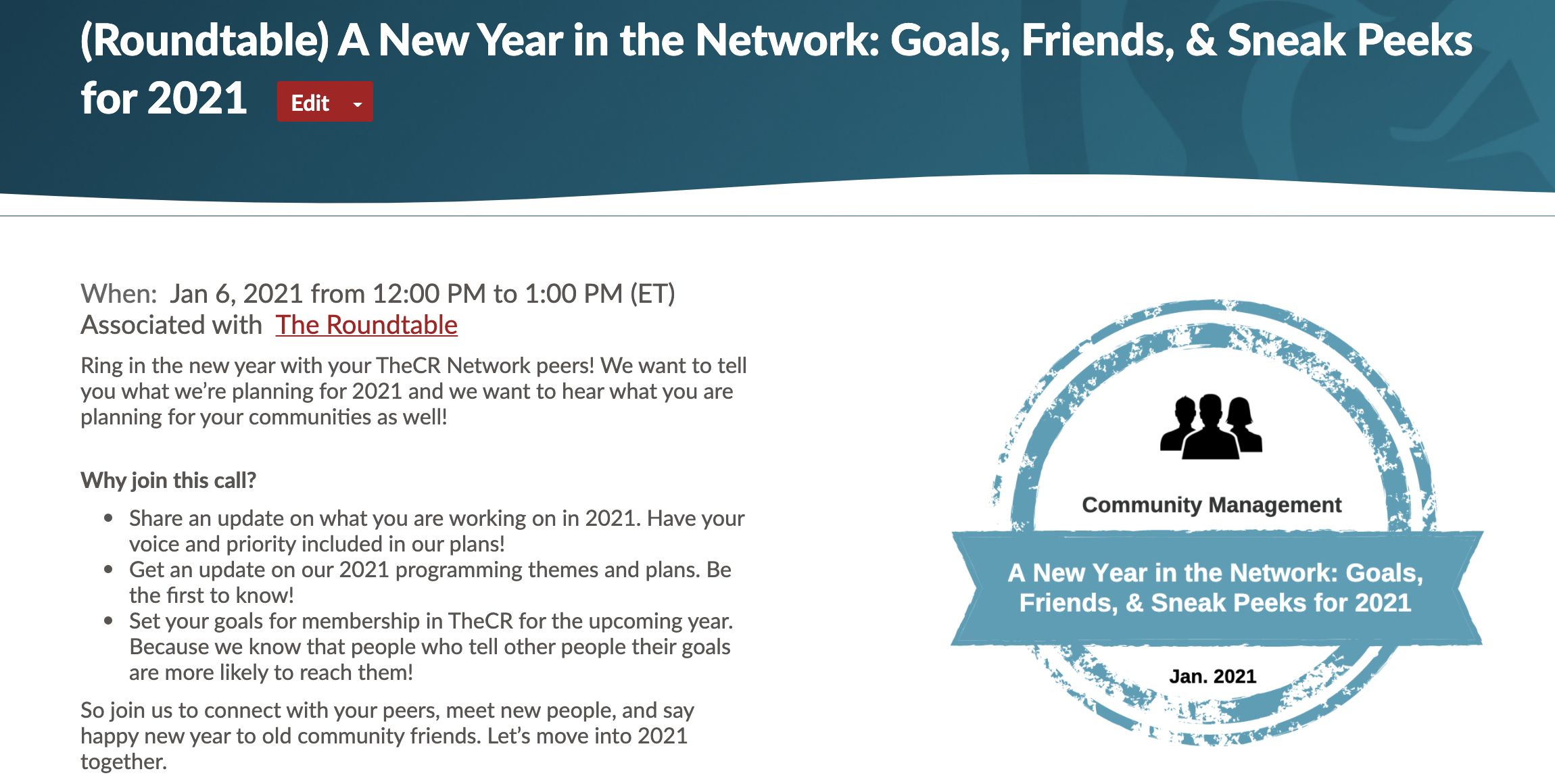
On, "A New Year in the Network: Goals, Friends, & Sneak Peeks for 2021", we gathered to meet members, share our goals and priorities for 2021, and share a bit about what we have in mind for the Network for the near and more distant future. After 2020 (or the year of upheaval, uncertainty, and most other "un-" words), we scheduled this annual call especially to ground ourselves and lay a solid foundation for the new year.
While this call does not feature many case studies or presentations, it was a great opportunity to see what people are focusing on at the moment and find where our commonalities lie. As many people are (and have been) focusing on metrics for the near future, one specific focus that seemed to be common was the focus on reporting for different audiences. In a similar fashion, user/member experiences was another common priority, with a specific focus being creating, managing, and leveraging knowledge or resource libraries.
Overall, another common goal was to connect with and learn from peers more frequently, which is something we also heard from the results of our end of 2020 member survey as well as ad hoc feedback we have received.
So, TheCR Network Team's homework for 2021 is to create more opportunities for members to reach these goals. Keep an eye on the Roundtable Programming Guide for some opportunities to discuss and dig into these topic areas a little more deeply and look for opportunities to connect with other members as we continue exploring and experimenting with new tools and programming ideas.
If you have seen a tool or type of programming that you have been interested in trying, please feel free to reach out to the Network team or leave a comment below and we can explore together!
If you want to catch up on this call, you can find the Roundtable Report here.
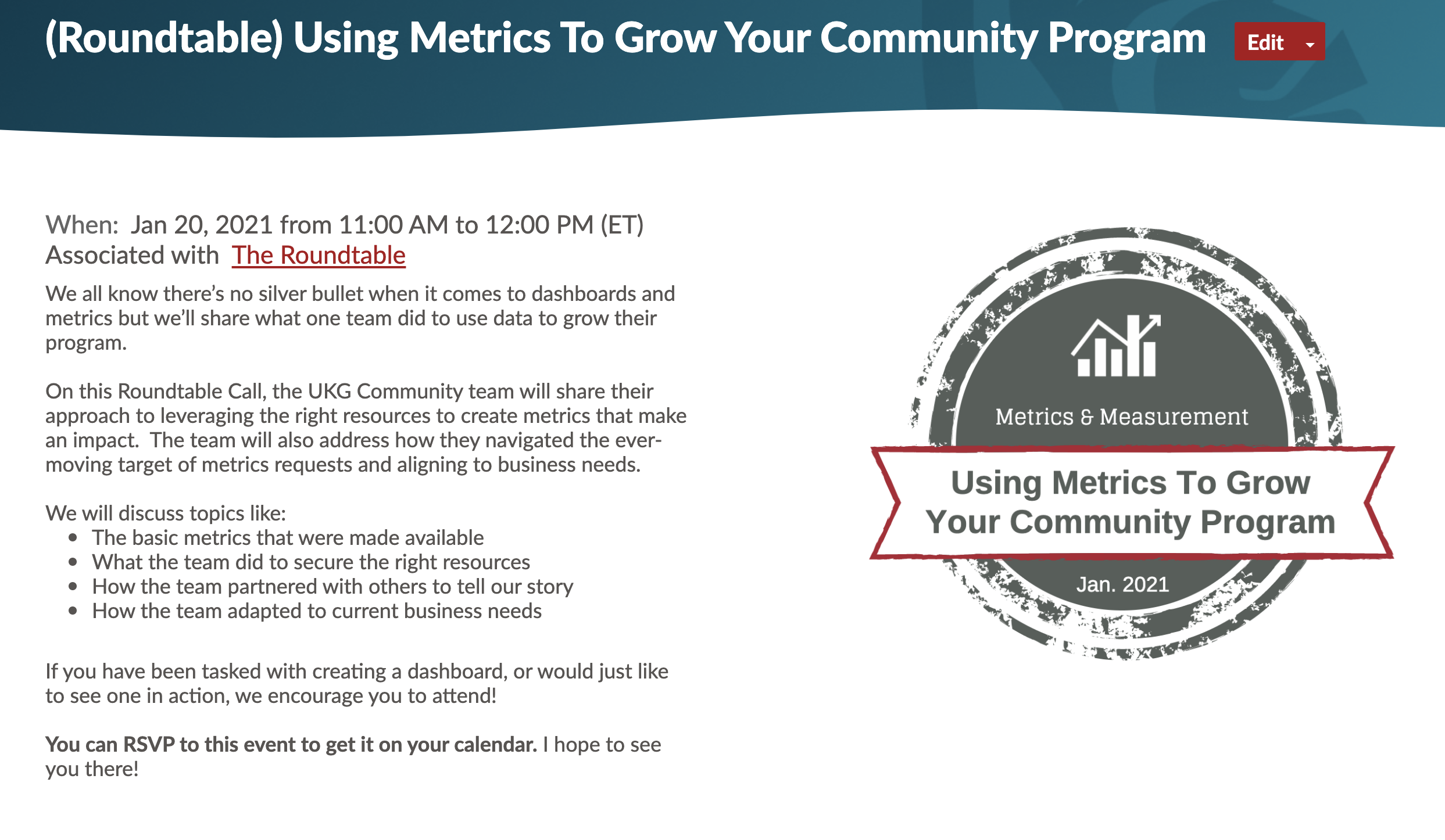
Our second Roundtable Call of the month, "Using Metrics To Grow Your Community Program", featured @Keri Kersten and the Ultimate Kronos Group (UKG) community team's work on the award-winning Ultimate Software community metrics dashboard.
Winner of Outstanding Community Dashboard TheCR Award in 2020, Keri talked through how the team pulled together resources that were able to secure them resources through connecting metrics to business needs and providing benchmarks to organizational leaders and stakeholders.
With metrics being a core competency of community work, we know that we can also grow, develop, and adapt our metrics, so this call was especially relevant at the start of a year, when many of us are focusing on our reporting strategies. One key aspect that made Keri and her team's dashboard so successful was fully investing in the creation of the dashboard in the hiring of a data analyst. The data analyst not only knew what metrics to pull and how to curate them, but they also were able to give context and translate any metrics or differences that the community team highlighted.
This point about using an expert to spot notable data is especially helpful when thinking about foundations and fundamentals, if only to act an as a reminder that you do not need to be the master of all things, but you can find others who can complement your strengths and masteries. Whether it is through hiring someone, collaborating with a colleague or stakeholder, or asking for support from peers, there are accessible ways to grow and learn.
If you are interested in listening in to this call, you can find the edited Roundtable Recording here.
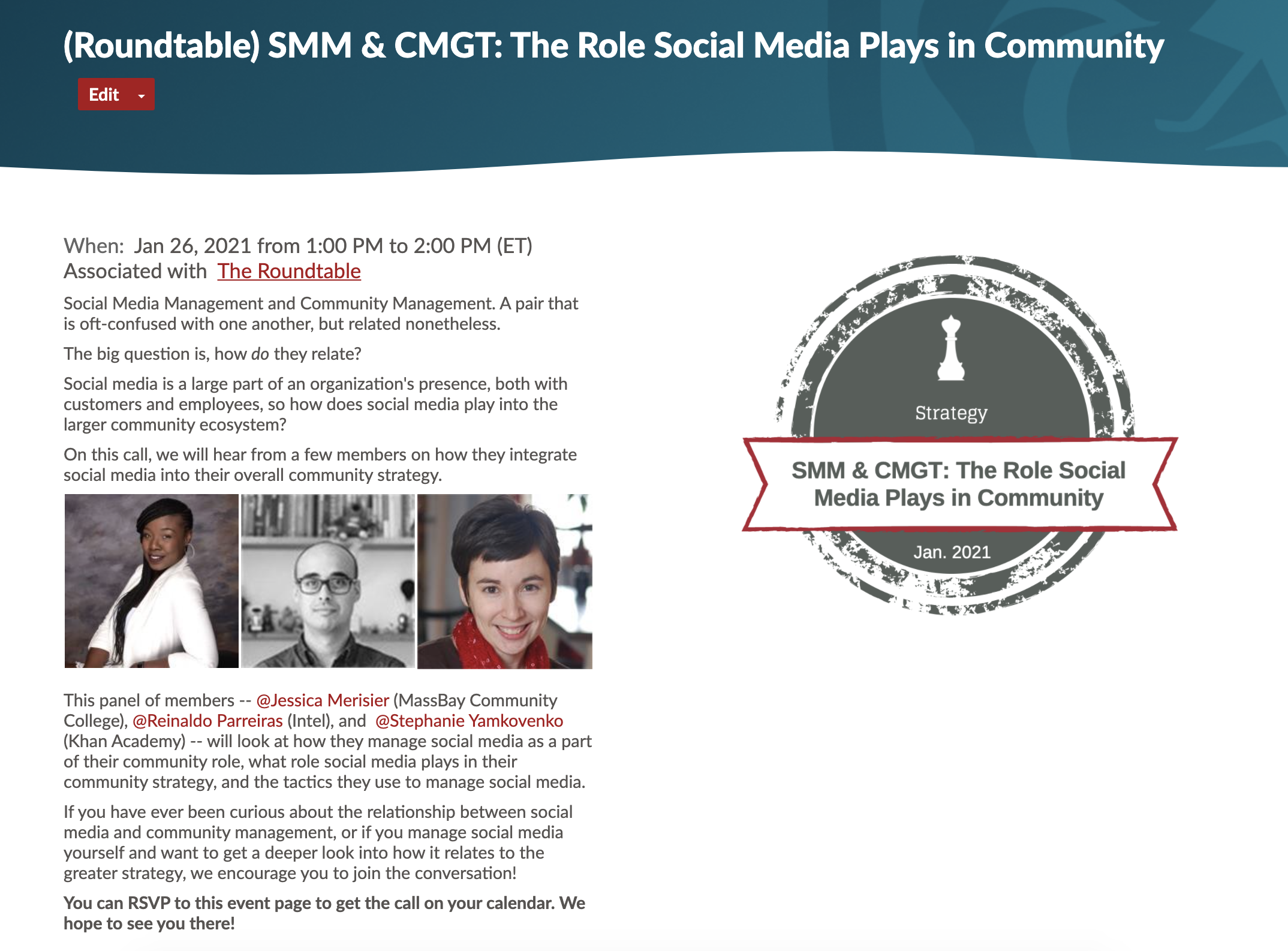
The call, "SMM & CMGT: The Role Social Media Plays in Community", featured a panel of members as they discussed their work in and approaches to integrating social media into community strategies.
On this call, @Jessica Merisier, @Reinaldo Parreiras, and @Stephanie Yamkovenko discussed topics like managing tools, expectations, and challenges. They also shared case studies and big wins that they have in working with social media in community.
There were a couple of key takeaways and points made on the call that every question finds its way back to: keep your people in the forefront and think of your purpose. Reinaldo mentioned how they are working to make social media more "social", and both Jess and Stephanie discussed how you need to prioritize the people you are speaking to, know them, and speak directly to them. You need to know the reason why you are using the tools you are using and why you are using them to speak to who you are speaking to. Do not just use a tool just to use it. If it does not make sense, do not use it. If you have nothing of value to add to a conversation, do not step in.
But, there was also a great point made about having fun. We know that community is about building relationships, and relationships can be built on coming together around a shared purpose. Sometimes, that shared purpose is enjoyment. All of the panelists discussed participating in some fun prompts, memes, and trends to much success. We know that something like a pet thread is not going to single-handedly raise our retention rates or make employees productive, but it does connect people to one another through fun and enjoyment. We are human, are we not?
This call was a great reminder that, no matter what tool you are using or what audience you are speaking to, it is always good to go back to basics and remember that your purpose and your members are the core of what you are doing.
If you are interested in listening in to this call, you can find the edited Roundtable Recording here.
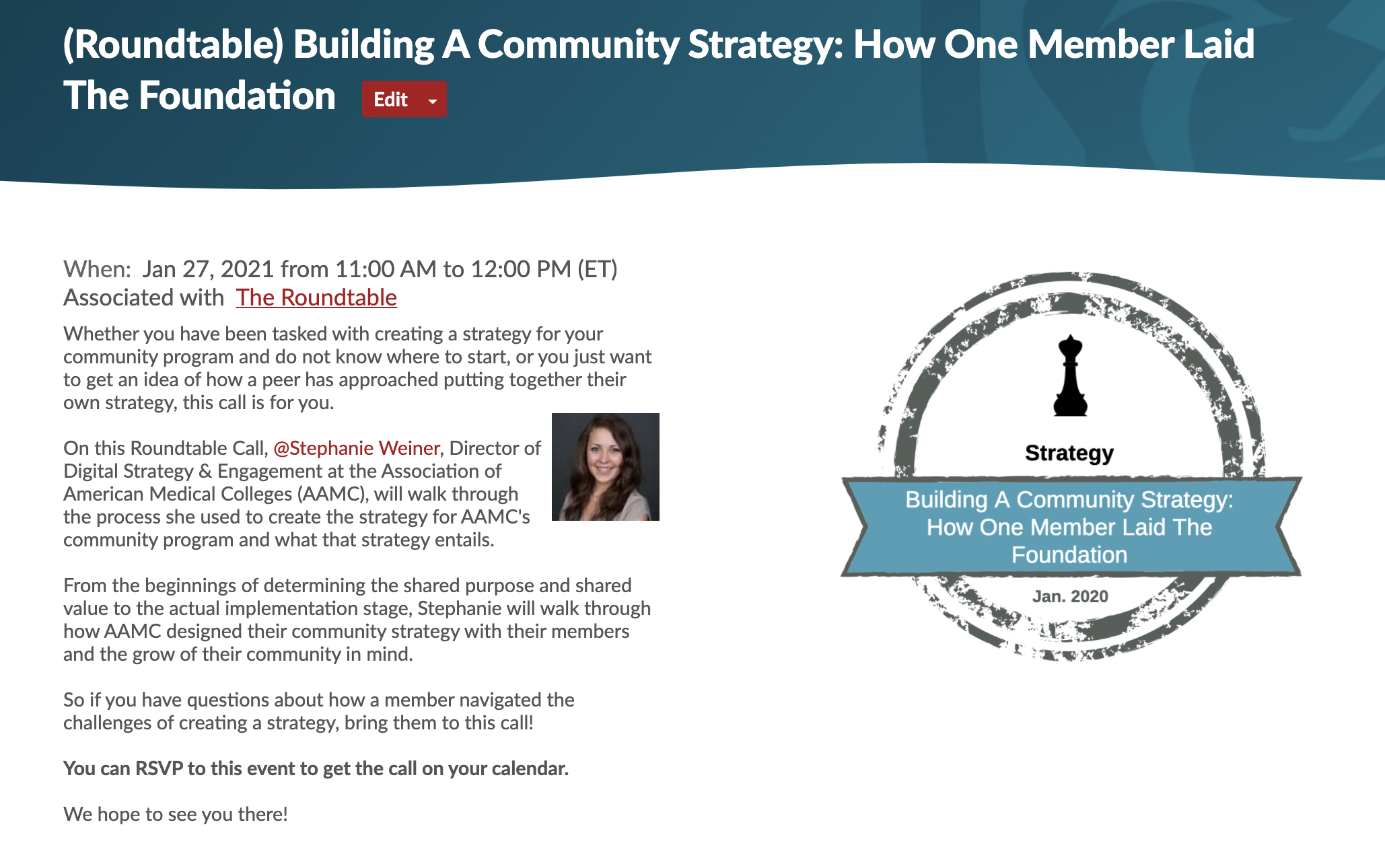
Our last Roundtable Call of January, "Building A Community Strategy: How One Member Laid The Foundation", focused on a case study from Stephanie Weiner of AAMC on how she and the AAMC community team were able to create and launch their new community's strategy.
Taking us through the stages of building a strategy as well as how they adapted the core elements to fit their non-profit use case, Stephanie gave us an informative and timely look at how we can build up another core competency of community work: strategy.
Strategy is not something that is one and done; it is a long-term project that changes and will be refreshed over time. In discussing AAMC's strategy work, Stephanie emphasized the value of being flexible, yet focused. 2020 was a reminder that we may not always know what is in the future, so we need to leave space to react and adapt, especially in planning for our communities' futures. But that does not mean we should have goals or a priority in sight. We just need to be open to adapting and make sure that we check in on a regular basis to adjust our strategy to fit the context we are working in.
We need to work with others, get feedback from members, and be open to experimenting in finding what is most valuable for our member segments. It can be a daunting task, but just take it one step at a time.
If you want to listen in on this Roundtable Call, you can find the Roundtable Recording here.
And now for something a little different...
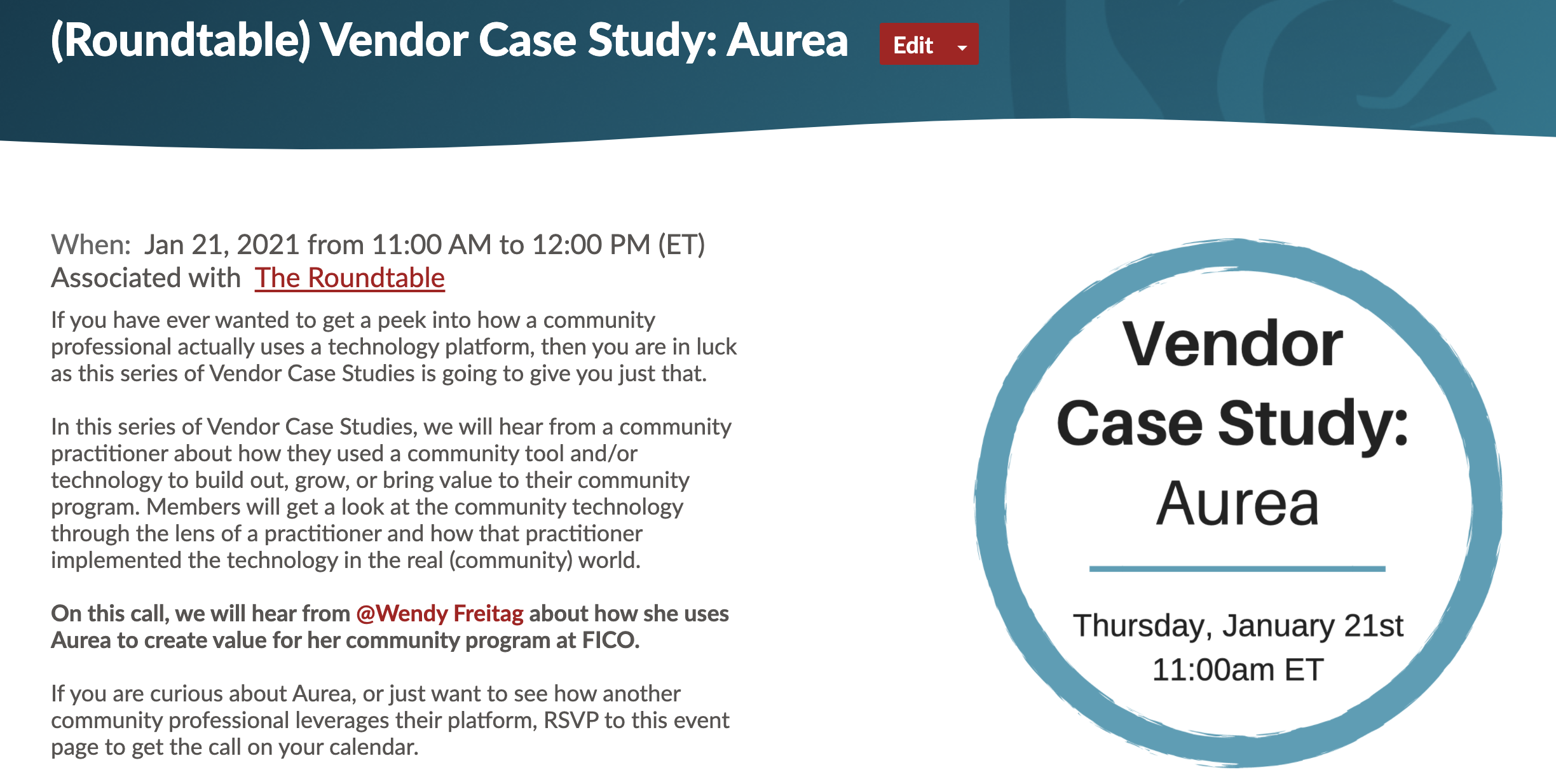
With the intention of providing a well-rounded amount of information on different platforms, we continue to collaborate with our vendor partners to run briefings, demos, and case studies for Network members. This call -- our Vendor Case Study with Aurea (previously known as Jive Software) -- featured one member and their work in cleaning up and managing their Aurea community through the platform's key features.
@Wendy Freitag graciously walked us through her amazing work in this case study call that was valuable to both Aurea/Jive end users and non-Aurea folks alike. As a non-Aurea end user myself, I found it extremely helpful to see how someone else approaches these kinds of projects and ideas. While we do not have all of the same features and tools available, there are concepts and ways of working with the functionality you do have that translates across most technology lines.
Another core competency of community work, tools and technology are key to the development and growth of many aspects of our community programs and strategies. Learning about other tools as well as how peers utilize their own technology can help both broaden our understanding of the ecosystem and open up our thinking about how we can implement and get creative with our own tools.
If you want to listen in on this Roundtable Call, you can find the Roundtable Recording here..
We heard some great examples and had some great discussions this month, so why not round it out with what we learned about members of TheCR Network overall...
What Did You Think?
For the month of January, we opened up a poll to get an understanding of our TheCR Network members elicit feedback from their own members (if they do!). With a key aspect of community being the members and collaborating with members, we know that getting feedback from these people is a great way to find out how to create value and also make sure you are hitting the right marks.
We know that it is not always easy to enact formal feedback opportunities, but we do know that it is important, so let us find out how members of TheCR Network approach feedback in their communities...

The poll results come from a sample size of 31 respondents and show that the vast majority get feedback informally by checking in with members either personally or through personal tools. The other three responses received an equal amount of votes, with almost 10% not collecting feedback at all and almost 10% having formal, regularly-scheduled methods of gaining feedback.
While this latter option is the most ideal and mature option, we know that it also not always feasible nor is it an immediate option for many, so observing that a majority of this group of respondents (about 10% of our membership base, so 70% of 10%) is a great observation to note. It shows that we are getting the information we need through some means and, while it may not be formalized yet, we have the foundations there to build upon.
For anyone in the first two buckets, it does not mean that there is not a foundation to build upon, but it just may not be as set or fully planned out yet, and that is okay! It just means there may be a little more work to get there. But that is what we are here to do!
Our goal with this poll was to check in on one fundamental aspect of community management and see where we stand. Doing so can help guide our goals and priorities moving forward.
And speaking of moving forward, let's look forward to next month, shall we...
So, Where Do We Go From Here?
Our goal for January was to refresh, set our feet in the new year, and start digging into the areas we want to prioritize for 2021, and we did just that. In reminding ourselves that it is not only okay, but suggested and encouraged to take another look at the fundamentals, January was the perfect opportunity to learn from others in several key competencies of community work.
But now it is time to take that forward and figure out what comes next.
For 2021, we are looking forward to taking these conversations further and digging more into these areas of interest: defining goals, identifying key relationships, exploring metrics, designing programming, and more.
So, if any of these conversations or concepts have sparked an idea or recommendation from you, let us know! While we plan our programming calendar, we also leave space for reactive programming, spur-of-the-moment topics, and member involvement, so leave us a note or send us a message and we'll get something together to address your topics of interest.
And if you're not a member of TheCR Network, or if you know someone who isn't a member of TheCR Network, but would love to participate in these conversations, please reach out! We're happy to talk about how you or they can get involved.
If you'd rather do that yourself, you can find out more about how to join TheCR Network here.